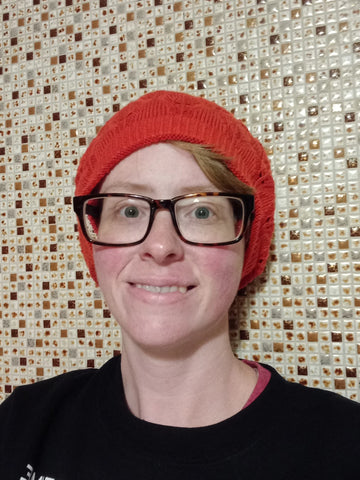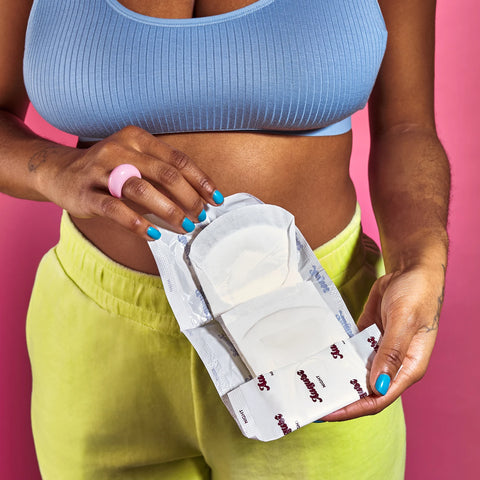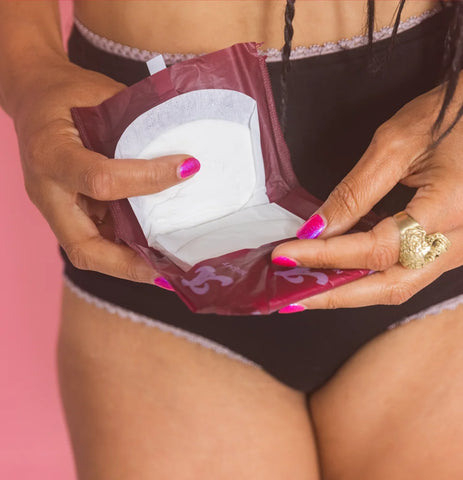We’re so excited about the recent win for the #BeyondMyPeriod population: the UK government is slashing the cost of HRT used to treat menopausal symptoms!
In this prescription scheme, a year's worth of Hormone Replacement Therapy (HRT) treatment could be available for less than £20. This would help 400,000+ menstruators who are entering menopause. We’re hoping that this fuels the fire for more support & research about the post-period experience.
Even though many people report experiencing 3 to 4 symptoms simultaneously, only about half will seek treatment. It is also reported that the reason fewer people choose to take HRT is that there is a lack of familiarity & information about this product and its effects.
In addition to the more affordable treatment option, more emphasis should be put on research about menstruation and the post-period experience. Perhaps then, the percentage of menopausal people benefiting from treatment will increase.
Keep reading to find out why HRT is used for menopause treatment
Sources:
- #AskAugust, verified by: Alloy Health’s Chief Medical Officer, Dr. Sharon Malone MD, FACOG, CNMP (who also verified this article)
- NHS (2019): Overview on Hormone Replacement Therapy (HRT)
- Constantine G. D., Graham, S., Clerinx, C., Bernick, B. A., Krassan, M., Mirkin, S., & Currie, H. (2016). Behaviours and attitudes influencing treatment decisions for menopausal symptoms in five European countries. Post reproductive health, 22(3), 112–122. https://doi.org/10.1177/2053369116632439
- Çilgin H. (2019). Predictors of Initiating Hormone Replacement Therapy in Postmenopausal Women: A Cross-Sectional Study. The Scientific World Journal, 2019, 1814804. https://doi.org/10.1155/2019/1814804
What is HRT?
Hormone Replacement Theory (HRT) is a treatment option used to relieve common symptoms of menopause.
What is menopause & why does it happen?

Menopause is the permanent end to a person’s reproductive years. A person is officially in menopause when they haven’t had a period for 12 months.
Put simply, menopause is when your period ends for GOOD!
Menopause can happen naturally, or be induced by the surgical removal of the ovaries, chemotherapy or genetic factors.
Natural menopause happens when the eggs & estrogen (hormone) that are normally produced during the menstrual cycle are no longer in production. Estrogen is essential to thicken your uterine lining, ovulation, and beyond menstruation, is critical for the following functions:
- hydrating cells
- producing collagen
- building bone mass
- mitigating inflammation
These all come back as menopausal symptoms…keep reading.
What are the symptoms of menopause?
Common symptoms of menopause are:
- pain or uncomfortability
- vaginal dryness
- sleep problems
- mood swings
- weight fluctuations
- and decreased sex drive.
Click HERE for a comprehensive list of menopause symptoms.
How does HRT help with menopause symptoms?
HRT replaces low-level hormones. According to both Dr. Malone and the study by Constantine et al., (2016) HRT is the most effective treatment for the symptoms of menopause.
For those with a uterus, HRT consists of estrogen and a progestin to protect the uterine lining from cancer.
If you do not have a uterus (usually due to hysterectomy), you may still have phantom symptoms and so you only need estrogen.
How effective is HRT?

Compared to the use of HRT, symptom relief is reported to be less effective with other prescription and nonprescription therapies (Table 3: Constantine et al., 2016). Including, antidepressants, sleeping pills, phyto-estrogens, herbal treatments, homeopathic treatments, vitamins or food supplements, or over-the-counter (OTC) gels or creams), and lifestyle changes.
A little call-in before you go:
Many news reports about the recent UK news are saying that women, exclusively, are the ones seeking HRT for menopause. Let’s remember to include EVERYONE with a uterus in our news by using terms like:
- “People with periods”
- “Menstruators”
- “Post-menopausal people”
- “Those seeking treatment”
Afterall, not all menstruators are women and not all women menstruate!
p.s There’s a lot of talk about HRT for the menopausal community. If, however, you’re looking for gender-affirming care in the UK, check out the Gender Identity Development Service.
For more information about menopause & HRT…
- #AskAugust
- Stay up-to-date on UK news about HRT offerings
- Read up on UK-specific details from the NHS































